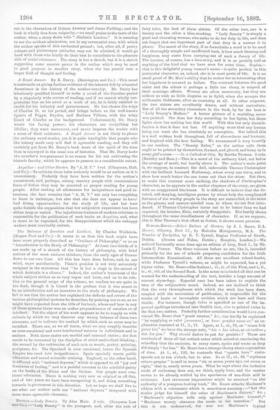fairy tales, the best of three sisters. Of the other
two, one is a beauty and the other a blue-stooking. " Lady Beauty " is simply a good and charming woman, who seeks to do her duty in life, and does not forget that one important part of that duty in a woman is to please. The moral of the story, if so formidable a word is to be used of a thoroughly simple and unaffected book, is how much blessing and happiness may come from carrying.out of such a theory of life. The heroine, of course, has a love-story, and it is as prettily told as anything of the kind that we have seen for some time. Sophia— that is this delightful young woman's name—is quite perfect in this particular character, as, indeed, she is in most parts of life. It is no small proof of Mr. Muir's ability that he makes her as interesting after her happiness is secured as before. The contrast between the good sister and the others is perhaps a little too sharp, in respect of their marriage affairs. Women are often mercenary, but they are seldom so with as little disguise as is Sybil, when she accepts the millionaire Goldrnore, after no courtship at all. In other respects, the two sisters are excellently drawn, and without caricature. But of all the secondary characters in the book, by far the best is "Lady Beauty's Mother." A better picture of a worldling never was painted. She does her duty according to her lights, but those lights show her nothing but this world. With this her only dissatis- faction is that it does not last. Of anything more that any human being can want she has absolutely no conception. But indeed this is a well written book throughout, full of shrewdness and humour, and inspired with the best feeling. We recommend it very heartily to our readers. The "Beauty Rules," as the author calls them ought to be printed by themselves, framed, and glazed, and hang up in every girl's room.—In a Cathedral City. By Bertha Thomas. 2 vols. (Bentley and Sons.)—This is a novel of the ordinary kind, not below the average of merit, but hardly above it. The author's main point is, we suppose, to contrast the dull, unloveable Thomas Christopher with the brilliant Leonard Hathaway, whom every one loves, and to show how much better the one turns out than the other. But then, to make this contrast more striking, the shadows of Christopher's character, as he appears in the earlier chapters of the story, are given with an exaggerated blackness. It is difficult to believe that the do- voted, self-denying, intelligent person by whose help the complicated fortunes of the worthy people in the story are unravelled, is the same as the gloomy and narrow-minded man to whom we are first intro- duced. If Thomas Christopher turns out to be better than we had expected, the heroine, Elsie, certainly disappoints. She hardly shows throughout the same steadfastness of character. If, as we suppose, this is Miss Thomas's first effort at fiction, it shows some promise.






























 Previous page
Previous page